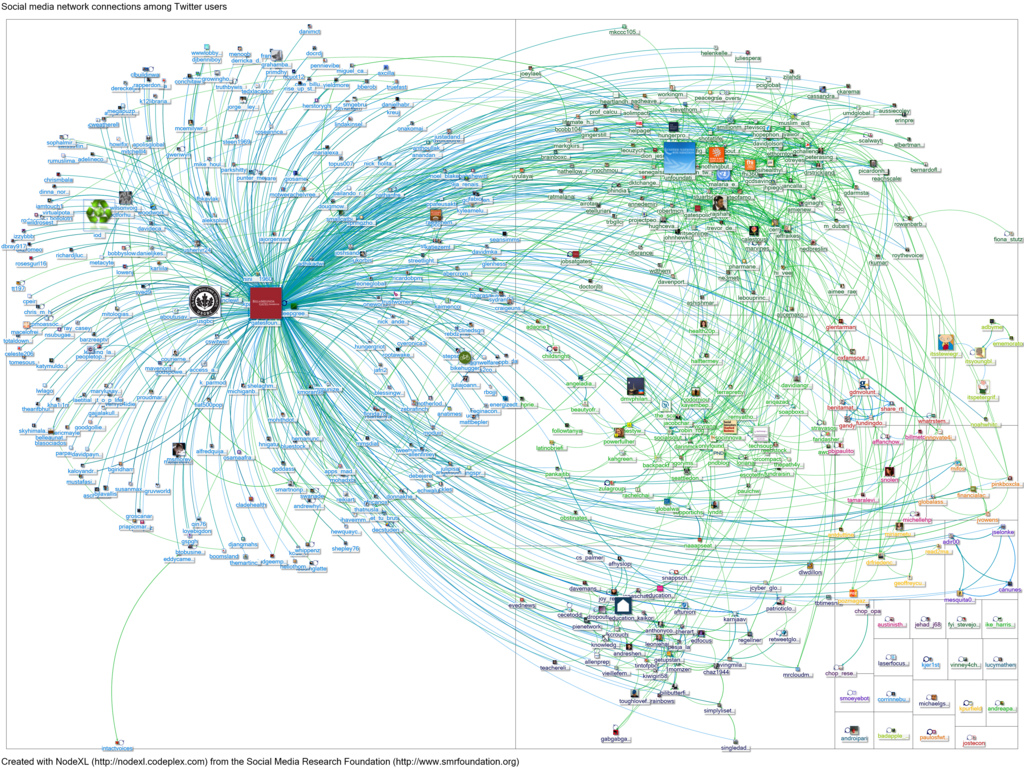Guest Post: The Bill & Melinda Gates Foundation is hosting a number of events today in anticipation of the opening of the philanthropy’s new public visitor center. Social media, and media in general, will play a big role in it.
If they use Twitter or Facebook to tell people about it, chances are the story will look like this:
That’s a Twitter Map (here’s a more readable but huge link) made by Marc Smith, a sociologist who studies online communities, founder of the Social Media Research Foundation and former chief of Microsoft Research’s community technologies group.
The map, he says, indicates a fairly insular and uncommunicative bunch of folks.
“It’s mostly just an echoing of the Gates Foundation,” said Smith. “There’s not a lot of response, or engagement. Basically, it looks like people preaching to the choir.”
What the map also shows, according to another social media researcher, Ines Mergel of Syracuse University, is the disconnectedness of the global health community.
Says Mergel: “What the network shows is that Gates serves as a broadcaster (see the star network on the left side around Gates Twitter account), but does not help to encourage the community to actively connect with each other. Ties are not reciprocated and there are very little interactions among the overall community.”
You can go to Smith’s Flickr account to get a look at how other communities look on social media and read more about the methodology at NodeXL. I got a little lost, to be honest. But the gist of the Gates Foundation Twitter map, says Smith, is that the global health community doesn’t really engage in an active conversation.
Today, at the Gates Foundation, as part of the day’s events, journalists have been invited from all over the world to ponder the question of why the media, in general, does such a bad job of covering issues of global health, poverty and the like.
Here’s an overview of problem at the Gates Foundation’s Impatient Optimists blog, which raises the question: News Media in Crisis?
Answer: Yes.
Most would say it’s largely a crisis of the business model, or how to get paid. But Charlie Beckett, a London School of Economics prof who does think-tanks on media and wrote the blog post for the Gates Foundation, says it is also a crisis caused by trying to prop up an obsolete approach to journalism:
Journalists need to use the new technologies to tell their stories in new ways. I call it ‘networked journalism’. It means using tools like Twitter or mobile phones and it means working with the public to create the narrative. At our meeting in Seattle we are going to hear from huge traditional news organizations like the BBC who are using these techniques.
I like the promise of the new media technologies and the idea of getting journalists to network with the public to craft narratives (our discussion at Gates will be ‘covered’ on Twitter at #storytelling, by the way). I have come to actually love Twitter and see much of social media as quite promising for the future of journalism — again, if it can find a business model.
But Smith’s map raises another possible source of the problem here. Perhaps it is not just the disinterested, ignorant or change-phobic media that explains so few stories out of this arena.
Maybe part of the problem here is the passive, insular and sometimes simplistic nature of the narrative within the global health and development community itself.
This is a community devoted to — and advertising itself as — doing good. Humanitarians, in my experience, are exceptionally uncomfortable when forced to talk about things going bad. It also doesn’t help with fund-raising, of course. But it’s reality, and reality makes for better stories.
 KPLU’s Tom Paulson is a reporter with decades of experience covering science, medicine and global health in the US and beyond. He is the host of KPLU’s Humanosphere blog, where this post originally appeared.
KPLU’s Tom Paulson is a reporter with decades of experience covering science, medicine and global health in the US and beyond. He is the host of KPLU’s Humanosphere blog, where this post originally appeared.
Follow him on Twitter @tompaulson and reach him via email at tpaulson@kplu.org.





